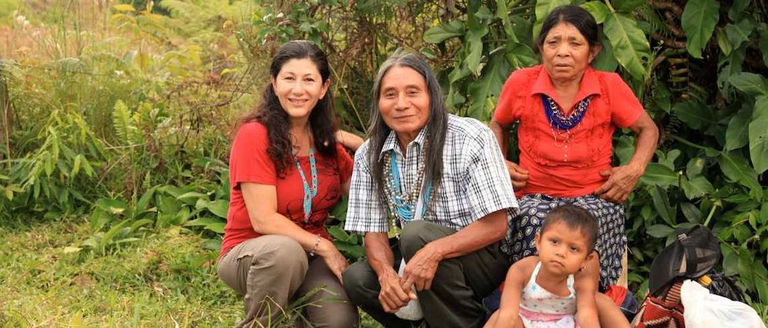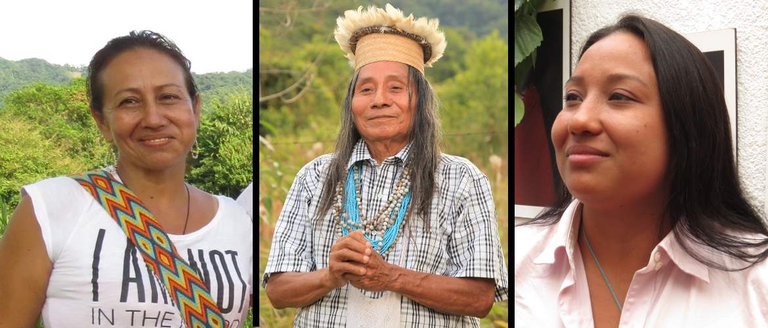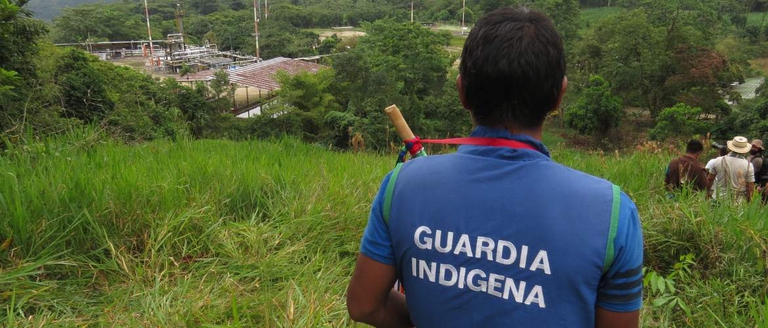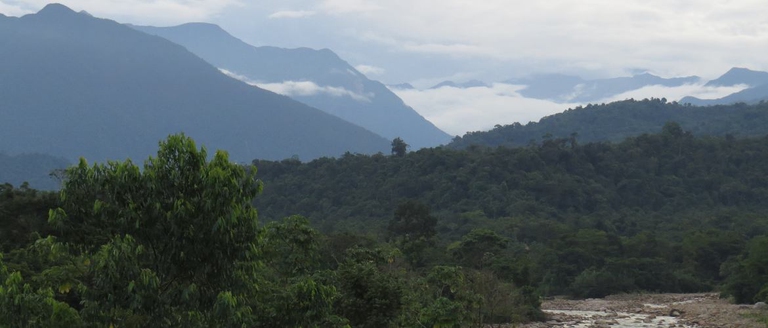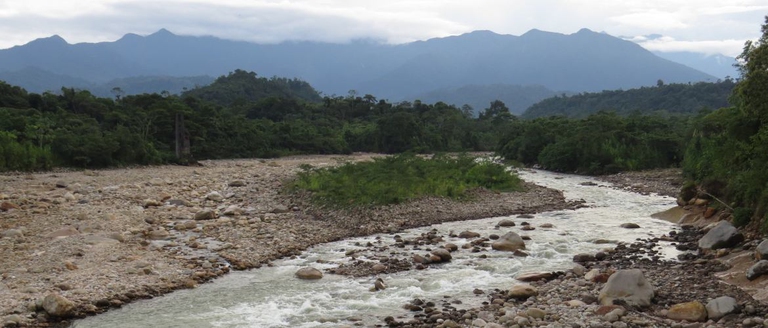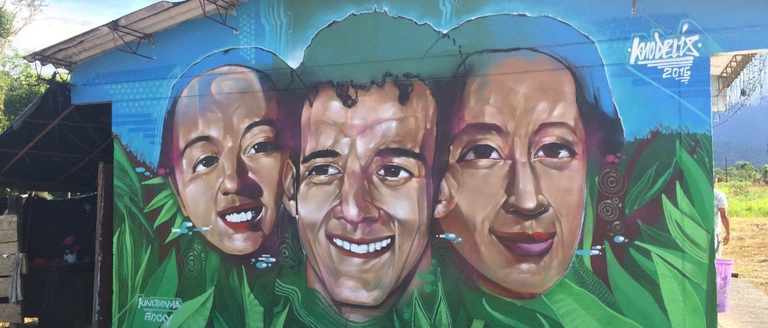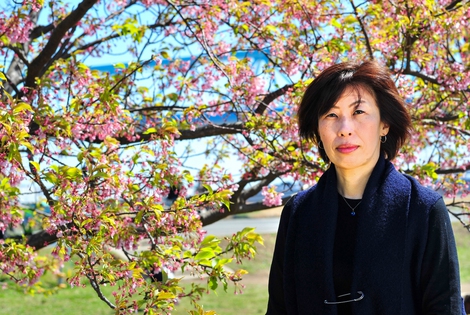
Three people putting the protection of the planet before themselves. Three powerful stories from Latin America, the deadliest region for environmental activists.
In late November of 2016, on the eve of the signing of the peace agreement in Colombia aimed at ending the five-decade civil war, I had the honour of visiting the U’wa people, a deeply spiritual indigenous nation in northeastern Colombia near the border with Venezuela. It was the first time in the nearly twenty
In late November of 2016, on the eve of the signing of the peace agreement in Colombia aimed at ending the five-decade civil war, I had the honour of visiting the U’wa people, a deeply spiritual indigenous nation in northeastern Colombia near the border with Venezuela.
It was the first time in the nearly twenty years since Amazon Watch began working with the U’wa that we were able to travel to their territory. The ongoing armed conflict in the region had made it impossible to travel there safely, until now.
The U’wa consider themselves the guardians of their sacred ancestral homeland. In accordance with their natural laws, for centuries they’ve successfully defended their territory high in the Andean cloud forests. The U’wa have resisted conquistadors, missionaries, colonists and, more recently, the oil industry, guerrillas, the military and paramilitary groups active in the region. A testament to the strength of their traditional leaders, they’ve survived these aggressions with their language, culture and a large area of their ancestral territories still intact.
My colleague Andrew Miller and I were part of a 22-person delegation taking part in the U’wa people’s Summit in the Defense of Life, Territory, and Natural Resources. Our group included human rights lawyers, indigenous leaders, filmmakers, visual artists, community solar providers and researchers from a dozen organisations and collectives. We had come to demonstrate our continued commitment to the U’wa people and the protection of Kera Chikara, their territory.
Amazon Watch first began to work with the U’wa in 1997 after they declared that they would rather die than allow Los Angeles-based Occidental Petroleum (Oxy) to drill for oil – a substance the U’wa believe to be the blood of Mother Earth – on their sacred ancestral territory. They issued a communiqué declaring their territory off-limits to oil exploitation and reminding the world of their history, specifically an incident that is kept alive in their songs and ceremonies: in the 1700s a band of the U’wa committed mass suicide to escape slavery at the hands of the conquistadors.
The communiqué read:
Respect for that which is alive and that which is not alive, for the known and for the “unknown” is part of our law: our mission in the world is to narrate it, sing it, and to fulfil this law in order to maintain the equilibrium of our universe …
We know that the Riowa (non-U’wa) have put a price on all that is alive, even the stone itself, he trades with his own blood and he wants us to do the same with our sacred territory, with ruiria, the blood of the earth which they call petroleum …
All the economic offers for what is sacred to us, like the earth and its blood, are an insult to our ears and a bribe to our beliefs … From us, there will be no betrayal of our Mother Earth, or of her sons who are our brothers. Neither will we betray the pride of our ancestors because our land is sacred and everything in it is sacred.
If to defend life we have to give our own, we will do it. (Excerpt from the Open Letter to Colombians, 1997)
On our recent visit to the U’wa territory we gained a deeper appreciation for the courage, vision and determination that for so long has defined the U’wa and has inspired millions of people around the world.
Upon arrival in Chuscal in U’wa territory we were warmly welcomed by Daris Cristancho, who is a pillar of the U’wa leadership, and her 27-year-old daughter, Aura Tegria, a brilliant, inexhaustible young lawyer who has emerged as a key force in recent years and is mounting the latest round of U’wa people’s legal defense.
Our time with Berito Kuwaru’wa, a key figure in the community, was another highlight of our visit. Berito, an elder and former U’wa President, was the first U’wa leader who brought the people’s message to the world.
During the course of the Summit we heard stories about Berito’s tireless efforts that led to legal recognition of the U’wa Unified Reserve and learned how he had expelled the missionaries who used to steal U’wa children – including him – and force them to adopt Christianity. In the 1990’s, U’wa converted the mission to a bilingual community-run school, a key symbol of their historical struggle.
Berito was also a leading figure in the tribe’s decade-long battle that forced Occidental Petroleum to abandon its oil project on U’wa land. For his visionary leadership, Berito was awarded the Goldman Environmental Prize in 1998 and today he continues to be a guiding force for the next generation of U’wa leaders always ready to share his songs, stories and prayers.
At the Summit, Berito passionately promoted his vision of expanding the boundaries of the U’wa Reserve and of constituting other indigenous reserves, Kuitua and Pedraza, where several thousand U’wa live, and in doing so unite the U’wa nation in one resguardo (reserve).
Berito, Daris and Aura represent three generations of visionary leadership joining a long tradition of courageous and committed U’wa leaders, many of whom we had the honour of working and travelling with over the past twenty years. From a young age the U’wa receive teachings from their Werjaya (spiritual elders) and Kerakas (medicine men) and learn about the U’wa’s purpose for existence: to preserve the equilibrium of the world.
The Werjaya and Kerakas make up the traditional authority of the U’wa people and their duty it is to know the history of the U’wa, mediate on their natural laws, communicate with the mountain and river spirits, and educate and orient each generation about their laws and cosmology.
Before every major action the U’wa spent days in ceremony meditation, chanting, rituals and prayers. While a part of the U’wa success has been their steadfast resistance, skilful organising and global campaigning, behind these actions are their spiritual beliefs and practices.
For example in the spring of 2001, when Oxy began drilling its first well to access the oil reserves beneath the U’wa territory, the Werjayas and Kerakas gathered for three months of fasting, meditation, prayer and chanting, asking their ancestors to hide the oil beneath their territory. Their strategy proved effective. Oxy spent 100 million dollars drilling the Gibraltar well to access an oil field the company estimated contained 1.2 billion barrels of oil, potentially Colombia’s largest oil find in decades. In May 2002 Oxy abandoned the oil project after announcing that it had only found natural gas and condensates.
The U’wa have inspired many around the world with their powerful declarations and courageous actions. They’ve often been on the forefront of indigenous rights debates and have masterfully forged global alliances with local campesino (small-scale farmer) associations, Colombian indigenous and social movements, and global solidarity networks. At one point in their struggle to stop Oxy’s drilling, 5,000 campesinos joined them in blockading the access road to the well site for over four months while some 20,000 Colombians mobilised solidarity actions around the country.
In an era of corporate-led globalisation the U’wa campaign was among the first successful global solidarity efforts for indigenous rights and corporate accountability. The U’wa were also the first to insist on leaving petroleum in the ground, a call that has since emerged as an imperative for addressing global climate change and been adopted by progressive movements around the globe from the Yasuní National Park in Ecuador to Northern Alberta in Canada.
In recent years the U’wa have created the Guardia Indigena, a cadre of over 400 hundred U’wa youth from throughout the vast territory, many of them sons and daughters of leaders and elders. Dressed in blue vests, the Indigenous Guard carry only a ceremonial walking stick and it is their task to protect the U’wa territory from various threats and engage in nonviolent actions when necessary. For the Summit they arrived from various parts of the U’wa territory, often one or two days walk across steep terrain.
At the Summit we learned more about the U’wa’s struggle to protect Mount Zizuma, the sacred birthplace of all of the rivers in their ancestral lands. Last year after a charity game of high altitude football was played on the snow capped peak of Mount Zizuma, the U’wa Guard moved to shut down access to this area. Within the boundaries of the Cocuy National Park, which overlaps the U’wa reserve, the area remains closed today and is being protected by the Guardia Indigena. The mountain is so sacred to the U’wa that only the spiritual leaders are authorised, on rare occasions, to climb its slopes in search of communication with the nature spirits. This struggle for the sacred Mount Zizuma has emerged as a key focal point for the U’wa people’s exercise of territorial rights.
Another victory we celebrated at the Summit for Life was the dismantling of the Magallanes Gas project in 2015. When Ecopetrol attempted to build a new platform and establish an exploratory gas well in a new area of the U’wa ancestral territory along the Cubogón River without their permission or consent, the U’wa took action. On our last day we visited this site and heard more about the U’wa actions that lead to the project’s dismantling.
Our rivers are not just rivers. Through them we communicate with our deities. They are the messengers and the messages flow in both directions. If they are polluted or if they die, we will no longer know what the gods want, and neither will the gods hear our cries nor our thanks. (Open Letter to Colombians, 1997)
The U’wa reserve extends 220,000 hectares across five provinces and stretches from the glacier peak of sacred Mount Zizuma (about 5,300 metres above sea level) to the alpine tundra (the Páramo) giving way to the biodiverse cloud forests. Their ancestral territory is at least another 400,000 hectares beyond the legally-recognised reserve.
As we entered U’wa territory we could see the enchanting mist-shrouded mountains extending in all directions, nearly a 360-degree view. It was impossible to capture their magnificence fully in photographs. Clouds continuously rose up from the forests and danced across the lush peaks. Beyond these mountains were more rows of mountains only half-visible and translucent, fading mysteriously into the sky. And beyond those, we were told, lay the snow-covered high peaks of the Cucuy range, which are only seen when weather conditions are just right.
This montane cloud forest ecosystem is a part of the headwaters of the Orinoco River Basin. It isn’t only sacred to the U’wa, it is also among the most endangered tropical ecosystems on the planet.
The U’wa are impressive conservationists. In accordance with their natural laws and customary practices, they leave the majority of their territory off-limits to humans, dedicating them to the protection of animals and spirits. Only the Werjayas are allowed occasional entrance for spiritual purposes. This explains why as far as the eye can see there are well-conserved forest-covered mountains.
At dawn on the first morning we walked with two leaders, Daris and Aura, down a trail to a nearby confluence of rivers to bathe and prepare ourselves for the day. Daris explained how the Werjaya communicate with Sira, the God of the U’wa people, via the rivers and waterways. Daris then guided us to the smaller of the two rivers, noting that some rivers are used to do healing ceremonies and thus carry away negative energies. The U’wa don’t enter those rivers for bathing. Other streams, like the one we bathed in, are meant for everyday use and to cleanse and restore our energies, she told us.
After contact with the Spanish conquistadors, slave traders and missionaries, the U’wa lost nearly two-thirds of their population to outside diseases. By the 1980s there were only 5,000 U’wa remaining. In recent years their numbers have recovered and today there are an estimated 10,000 U’wa, counting those who live outside the Unified Reserve.
The threats facing the U’wa territory and their culture didn’t go away when Oxy abandoned exploratory drilling. Following Oxy’s 2002 departure, the state oil company Ecopetrol assumed exploration of the Gibraltar complex, which is within an oil concession area known as Siriri-Catleya. Ecopetrol even attempted to do seismic testing inside the heart of the U’wa reserve but was thwarted by their resistance. Still, despite strong objections, Ecopetrol did drill two additional wells and finally found sufficient gas to move to commercial production.
The Gibraltar complex is located on a site of a sacred spring, on land the U’wa had legally acquired but which Oxy illegally expropriated in 2000. In recent years the drilling project, which produces high-grade gas liquids, has suffered several ruptures that have polluted the nearby Cobaria River. These spills further intensified the U’wa people’s actions to halt this project.
To establish what the U’wa call “territorial control”, in June-July of 2016 the Indigenous Guard organised a series of peaceful actions at the Gibraltar 3 well site. These actions lasted for over two months.
At the Summit we heard more about how, in one bold move and after 56 days of surrounding the plant, the U’wa moved to occupy it and shut down its power supply, thus halting all production. The local campesino association then joined the occupation in solidarity. The U’wa, as always, were unarmed and operating with the principles of nonviolence, upholding their natural laws. In the final days of the occupation, three helicopters full of infamous ESMAD anti-riot police arrived in the region to intimidate and forcibly remove the U’wa. After a tense standoff, the latter entered into a dialogue with the national government.
After twelve hours of intense meetings between the U’wa and various ministries, the government agreed to some of the U’wa demands, including advancing the legal recognition for two U’wa reserves (Kuitua and Pedraza) and the suspension of all tourism in their sacred Mount Zizuma, pending further social and environmental impact review. However, demand for the closure of the Gibraltar complex was rejected. Thus, the U’wa continue their legal battle to decommission the Gibraltar plant and annul all permits for oil and gas projects on their lands.
As this statement from a 1998 U’wa communiqué communicates so beautifully:
We will in no way sell our Mother Earth. To do so would be to give up our work of collaborating with the spirits to protect the heart of the world, which sustains and gives life to the rest of the universe. It would be to go against our own origins and those of all existence. (U’wa Communiqué, 10 August 1998)
Back at the height of the conflict with Oxy a national archives historian contacted the U’wa to let them know that he had found in the Colombian national archives the royal land deeds dating back to the King of Spain from the 1700s and 1800s, long before the existence of the Colombian state. These land deeds recognise the U’wa people’s absolute rights, including both surface and subsurface rights.
The U’wa later took these documents to the library of Seville in Spain to corroborate their authenticity with the version found in the archives of the Spanish Crown. The deeds are now are a part of the U’wa people’s ongoing legal strategy to both remedy past violations of their legal rights as well as protect against future attempts to impose destructive projects on their sacred lands.
With Aura Tegria now leading the U’wa Association’s legal strategy and with the help of a dedicated team of lawyers from EarthRights International and the leading Colombian human rights lawyers collective CCAJAR the U’wa have resumed their pursuit of a legal case that began in 1997 at the Inter-American Commission on Human Rights (IACHR). Just a few weeks after the Summit, the U’wa and the legal team presented a brief in form of a petition to the IACHR with detailed evidence alleging serious rights violations over the past twenty years. According to Aura, “the U’wa are requesting the adoption of the necessary measures to fully repair the enormous cultural, social, environmental, political and spiritual damage.”
With the IACHR case, the U’wa continue their unwavering drive to protect their ancestral territory and through this legal case seek both reparations and the cessation of aggressions against the U’wa Nation.
On our last day in the U’wa territory, when we visited the key sites of the U’wa struggle, the memories and images from the last twenty years streamed through my mind like a movie. I remember many happy moments celebrating the triumphs of the U’wa, such as Oxy’s departure or the dismantling of the Magallanes project.
I also remembered some very painful moments. Neither I nor the U’wa, nor any of their allies, will ever forget the heartbreaking tragedy of March 1999, when we got the news that the FARC guerrillas had captured and brutally killed three North American activists during a visit to the U’wa.
24-year-old Terrence (Terry) Freitas had met the U’wa on their first visit to the US, when they came to Los Angeles to confront Oxy, and for the next two years became their global ambassador for the campaign to halt the oil project. He founded the U’wa Defense Project and led a coalition of organisations working in solidarity with the U’wa. On the March 1999 trip, Terry had brought with him Lahe’ena’e Gay, a Native Hawaiian cultural leader who was part of the movement to bring back the Hawaiian language and Ingrid Washinowatok, an indigenous rights leader from the Menominee nation who was a global crusader for indigenous peoples’ rights, including at the United Nations. Their murders were devastating for family and friends and the tragedy deepened our bond to the U’wa people.
While on our way out leaving U’wa Territory, Berito recounted his experience of the kidnapping and showed where the three had been stopped by the FARC and taken before his eyes. Sadness gripped me thinking about the horrors the three experienced in those final days and I remembered the utter feelings of devastation we all felt then. Such tragedies aren’t a rare occurrence in Latin America, especially in the history of Colombia’s 50-year civil war, in which thousands of social and indigenous movement defenders and their loved ones were killed.
During the Summit many U’wa paid repeated tributes to honour the spirits of Terry, Lahe and Ingrid. “We U’wa traditional authorities feel the pain that is felt by the families of the three indigenous rights activists,” one U’wa community member said, “but we should also remember that they continue to live on with us, they continue helping the U’wa process”.
During the Summit an artist collective painted a beautiful mural on the walls of the U’wa assembly hall as a tribute to the three activists. Remembering the tragedy here where it happened and honouring the lives of Terry, Ingrid and Lahe together with the U’wa felt healing and significant.
The U’wa are among the very first indigenous groups that Amazon Watch had the honour of working closely with and we have learned so much from them about working in solidarity with indigenous communities.
The U’wa also hold dear our relationship of solidarity. Aura and Berito have publicly said that they believe that Amazon Watch and the U’wa Defense Project were created not by us activists but by the prayers of the Werjaya and the will of Sira. This is a beautiful interpretation of Amazon Watch’s creation story, especially knowing that we began working with the U’wa nearly from our inception.
I remember the day I first met Berito Kuwaru’wa. It was in October 1997. At the time, Amazon Watch was barely one year old. Berito had travelled to Los Angeles for the second time to declare his people’s opposition to the Oxy oil project on their sacred ancestral lands. Amazon Watch was hosting the U’wa at its then-home at the EarthWays Foundation, located on a spectacular bluff overlooking the Pacific Ocean in Malibu. Berito arrived accompanied by Terry. As I walked by the bluff to meet Berito for the first time, I noticed an incredible sight, and one that I’ve not seen since. Looking out on the ocean, we could see more than a hundred dolphins leaping out of the water, birds diving into schools of jumping fish and several whales spouting in the midst of all the dolphins. It was an incredibly rare moment. I welcomed Berito and positioned him to face the ocean to see all of the animals that had also shown up to welcome him. It seemed that Mother Nature was also demonstrating her support for the U’wa people.
As I left the U’wa territory on this recent trip, I felt a deep sense of gratitude for the honour to have accompanied and learned from this Earth honouring culture over the past twenty years. I’m proud of the work Amazon Watch has done to support the U’wa and so happy to have spent time with our U’wa friends. The U’wa are guardians of our common future. On this journey, we fully recommitted ourselves to continue global solidarity work with this people for decades to come and hope that those who learn about their cause will also want to join them.
Together with our Riowa brothers and sisters, our campesino friends, our little brothers, we would like to send solidarity to all communities across the globe that are struggling to protect their sacred mountain range, their sacred territory, the snow-capped peaks, the water, the ocean – places where all kinds of species are found, where we are able to communicate directly with them to guarantee harmony in the world.
We also request that the international community continue supporting the U’wa process, to continue in solidarity with us. Ensure that we aren’t the only ones protecting not only Kajka Ika (U’wa ancestral territory) but the whole Blue Planet, to protect life and the existence of all of humanity, everything that is alive and not alive.
For us everything is significant – the rocks, the mountains, the rivers – everything exists in relationship. And this needs to be maintained. We can’t continue destroying Mother Earth, we can’t continue taking the blood out of her. We also can’t continue using all natural resources to the damage of the ecosystem. That’s why I invite everyone to put their hands over their heart and to defend our U’wa process and all the other processes happening within indigenous territories. (Daris Cristancho, at the site of the now dismantled Magallanes gas project, 29 November 2016)
Siamo anche su WhatsApp. Segui il canale ufficiale LifeGate per restare aggiornata, aggiornato sulle ultime notizie e sulle nostre attività.
![]()
Quest'opera è distribuita con Licenza Creative Commons Attribuzione - Non commerciale - Non opere derivate 4.0 Internazionale.
Three people putting the protection of the planet before themselves. Three powerful stories from Latin America, the deadliest region for environmental activists.
Influential scientist, activist and author Vandana Shiva fights to protect biological and cultural diversity, and against GMOs.
Kimiko Hirata has blocked 13 new coal plants in Japan, but she hasn’t done it alone. The 2021 Goldman Prize winner tells us about her movement.
The Goldman Environmental Prize, the “green Nobel Prize”, is awarded annually to extraordinary activists fighting for the well-being of the planet.
A special report from the Yuqui territory delves deep into the dreams, challenges, joys and sadness of one of Bolivia’s most vulnerable indigenous groups.
The Yuqui people of the Bolivian Amazon fight not only to survive in the face of settlers, logging and Covid-19, but to preserve their culture and identity.
We talk to Shaama Sandooyea, activist and marine biologist from Mauritius onboard Greenpeace’s Arctic Sunrise ship in the heart of the Indian Ocean.
Jair Bolsonaro is accused of crimes against humanity for persecuting indigenous Brazilians and destroying the Amazon. We speak to William Bourdon and Charly Salkazanov, the lawyers bringing the case before the ICC.
Arrested for supporting farmers. The alarming detention of Disha Ravi, a 22-year-old Indian activist at the fore of the Fridays for Future movement.
